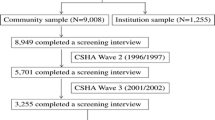Abstract
Background
Sense of control has been linked to improved health outcomes, but it is unclear if this association is independent of other psychosocial factors.
Purpose
The aim of this study is to test the strength of association between sense of control and self-reported health after adjustment for positive and negative affect, “Big 5” personality factors, and social support.
Method
Data on sense of control (measured by personal mastery, perceived constraints, and a health-specific rating of control), affect, personality, social support, and two measures of self-reported health (global rating of fair or poor health and presence of functional limitations) were obtained on 6,891 participants in the Health and Retirement Study, a population-based survey of older Americans. The cross-sectional association between sense of control measures and each measure of self-reported health was tested in hierarchical logistic regression models, before and after adjustment for affect, personality, and social support.
Results
Participants with higher personal mastery were less likely to report fair/poor health (odds ratio 0.76 per 1-point increase) while those with higher perceived constraints were more likely to report fair/poor health (odds ratio 1.37 per 1-point increase). Associations remained after adjustment for affect, but adjustment for affect attenuated the association of personal mastery by 37% and of perceived constraints by 67%. Further adjustment for personality and social support did not alter the strength of association. Findings were similar for the health-specific rating of control, and for associations with functional limitations.
Conclusion
Sense of control is associated with self-reported health in older Americans, but this association is partly confounded by affect.
Similar content being viewed by others
References
Skinner EA. A guide to constructs of control. J Pers Soc Psychol. 1996;71:549–70.
Bailis DS, Segall A, Mahon MJ, Chipperfield JG, Dunn EM. Perceived control in relation to socioeconomic and behavioral resources for health. Soc Sci Med. 2001;52:1661–76.
Bosma H, van Jaarsveld CHM, Tuinstra J, Sanderman R, Ranchor AV, van Eijk JThM, Kempen GIJM. Low control beliefs, classical coronary risk factors, and socioeconomic differences in heart disease in older persons. Soc Sci Med. 2005;60:737–45.
Cardarelli KM, Vernon SW, Baumler ER, Tortolero S, Low MD. Sense of control and diabetes mellitus among U.S. adults: a cross-sectional analysis. Biopsychosoc Med. 2007;1:19.
Gale CR, Batty GD, Deary IJ. Locus of control at age 10 years and health outcomes and behaviors at age 30 years: the 1970 British Cohort Study. Psychosom Med. 2008;70:397–403.
Koster A, Bosma H, Kempen GIJM, Penninx BWJH, Beekman ATF, Deeg DJH, van Eijk JThM. Socioeconomic differences in incident depression in older adults: the role of psychosocial factors, physical health status, and behavioral factors. J Psychosom Res. 2006;61:619–27.
Lachman ME, Weaver SL. Sociodemographic variations in the sense of control by domain: findings from the MacArthur Studies of Midlife. Psychol Aging. 1998;13:553–62.
Lachman ME, Weaver SL. The sense of control as a moderator of social class differences in health and well-being. J Pers Soc Psychol. 1998;74:763–73.
Pudrovska T, Schieman S, Pearlin LI, Nguyen K. The sense of mastery as a mediator and moderator in the association between economic hardship and health in late life. J Aging Health. 2005;17:634–60.
Seeman M, Lewis S. Powerlessness, health, and mortality: a longitudinal study of older men and older women. Soc Sci Med. 1995;41:517–25.
Dalgard OS, Håheim LL. Psychosocial risk factors and mortality: a prospective study with special focus on social support, social participation, and locus of control in Norway. J Epidemiol Community Health. 1998;52:476–81.
Bosma H, Schrijvers C, Mackenbach JP. Socioeconomic inequalities in mortality and importance of perceived control: cohort study. BMJ. 1999;319:1469–70.
Mackenbach JP, Simon JG, Looman CWN, Joung IMA. Self-assessed health and mortality: could psychosocial factors explain the association? Int J Epidemiol. 2002;31:1162–8.
Rodin J, Timko C, Harris S. The construct of control: biological and psychological correlates. In: Eisdorfer MP, Lawton GL, Maddox GL, editors. 1986; New York: Springer, p. 3–55.
Beekman ATF, de Beurs E, van Balkom AJLM, Deeg DJH, van Dyck R, van Tilburg W. Anxiety and depression in later life: co-occurrence and communality of risk factors. Am J Psychiatry. 2000;157:89–95.
Molinari V, Niederehe G. Locus of control, depression, and anxiety in young and old adults: a comparison study. Int J Aging Hum Dev. 1984;20:41–52.
Smits CHM, Deeg DJH, Bosscher RJ. Well-being and control in older persons: the prediction of well-being from control measures. Int J Aging Hum Dev. 1995;40:237–51.
Wolinsky FD, Stump TE. Age and the sense of control among older adults. J Gerontol Soc Sci. 1996;51B:S217–20.
Judge TA, Erez A, Bono JE, Thoresen CJ. Are measures of self-esteem, neuroticism, locus of control, and generalized self-efficacy indicators of a common core construct? J Pers Soc Psychol. 2002;83:693–710.
Willis L, Goodwin J, Lee K-O, Mosqueda L, Garry P, Liu P, Linn R, Wayne S. Impact of psychosocial factors on health outcomes in the elderly: a prospective study. J Aging Health. 1997;9:396–414.
Health and Retirement Study. http://hrsonline.isr.umich.edu/index/php. Accessed 5 May 2011.
St. Clair P, Blake D, Bugliari D, et al. RAND HRS Data Documentation, Version 1; 2009. http://www.rand.org/labor/aging/dataprod/randhrsi.pdf. Accessed 5 May 2011.
Clarke P, Fisher G, House J, Smith J, Weir D. Guide to content of the HRS Psychosocial Leave-Behind Participant Lifestyle Questionnaire: 2004 & 2006. Documentation Report v2.0 [December 2008]. http://hrsonline.isr.umich.edu/sitedocs/userg/HRS2006LBQscale.pdf. Accessed 5 May 2011.
Benyamini Y, Leventhal EA, Leventhal H. Elderly people’s ratings of the importance of health-related factors to their self-assessments of health. Soc Sci Med. 2003;56:1661–7.
Pearlin LI, Schooler C. The structure of coping. J Health Soc Behav. 1978;19:2–21.
Mroczek DK, Kolarz CM. The effect of age on positive and negative affect: a developmental perspective on happiness. J Pers Soc Psychol. 1998;75:1333–49.
Lachman ME, Weaver SL. Midlife Development Inventory [MIDI] Personality scales: Scale construction and scoring. Technical report. Waltham, MA: Brandies University, 1997. http://www.brandies.edu/departments/psych/lachman/pdfs/midi-personality-sclaes.pdf.
Theorell T, Karasek RA. Current issues relating psychosocial job strain and cardiovascular disease research. J Occup Health Psychol. 1996;1:9–26.
Belkić K, Landsbergis P, Schnall P, Baker D, Thorell T, Siegrist J, Peter R, Karasek RA. Psychosocial factors: review of the empirical data among men. In: Schnall P, Belkić K, Landsbergis P, Baker D, editors. The workplace and cardiovascular disease. Philadelphia, PA: Hanley and Belfus, Inc; 2000, p. 24–49.
Chapman BP, Duberstein PR, Sörensen S, Lyness JM. Personality and perceived health in older adults: the five factor model in primary care. J Gerontol Psych Sci. 2006;61B:P362–5.
Friedman HS, Booth-Kewley S. The “disease-prone personality”. A meta-analytic view of the construct. Am Psychol. 1987;42:539–55.
Duberstein PR, Sörensen S, Lyness JM, King DA, Conwell Y, Seidlitz L, Caine ED. Personality is associated with perceived health and functional status in older primary care patients. Psychol Aging. 2003;18:25–37.
Goodwin R, Engstrom G. Personality and the perception of health in the general population. Psychol Med. 2002;32:325–32.
Turiano NA, Pitzer L, Armour C, Karlamangla A, Ryff CD, Mroczek DK. Personality trait level and change as predictors of health outcomes: findings from a national study of Americans (MIDUS). J Gerontol B Psychol Sci Soc Sci. 2011. doi:10.1093/geronb/gbr072.
Donnellan MB, Lucas RE. Age differences in the Big Five across the life span: evidence from two national samples. Psycho Aging. 2008;23:558–66.
Roberts BW, Kuncel NR, Shiner R, Caspi A, Goldberg LR. The power of personality: the comparative value of personality traits, socioeconomic status, and cognitive ability on predicting important life outcomes. Perspect Psychol Sci. 2007;2:313–45.
Ferguson E, Bibby PA. Openness to experience and all-cause mortality: a meta-analysis and requivalent from risk ratios and odds ratios. Br J Health Psychol. 2011, [Epub]. doi:10.1111/j.2044-8287.2011.02055.x.
Watson D, Pennebaker JW. Health complaints, stress, and distress: exploring the central role of negative affectivity. Psychol Rev. 1989;96:234–54.
Acknowledgment
This work was supported by the Intramural Research Program, National Institute of Arthritis and Musculoskeletal and Skin Diseases, National Institutes of Health.
Author information
Authors and Affiliations
Corresponding author
Rights and permissions
About this article
Cite this article
Ward, M.M. Sense of Control and Self-Reported Health in a Population-Based Sample of Older Americans: Assessment of Potential Confounding by Affect, Personality, and Social Support. Int.J. Behav. Med. 20, 140–147 (2013). https://doi.org/10.1007/s12529-011-9218-x
Published:
Issue Date:
DOI: https://doi.org/10.1007/s12529-011-9218-x



